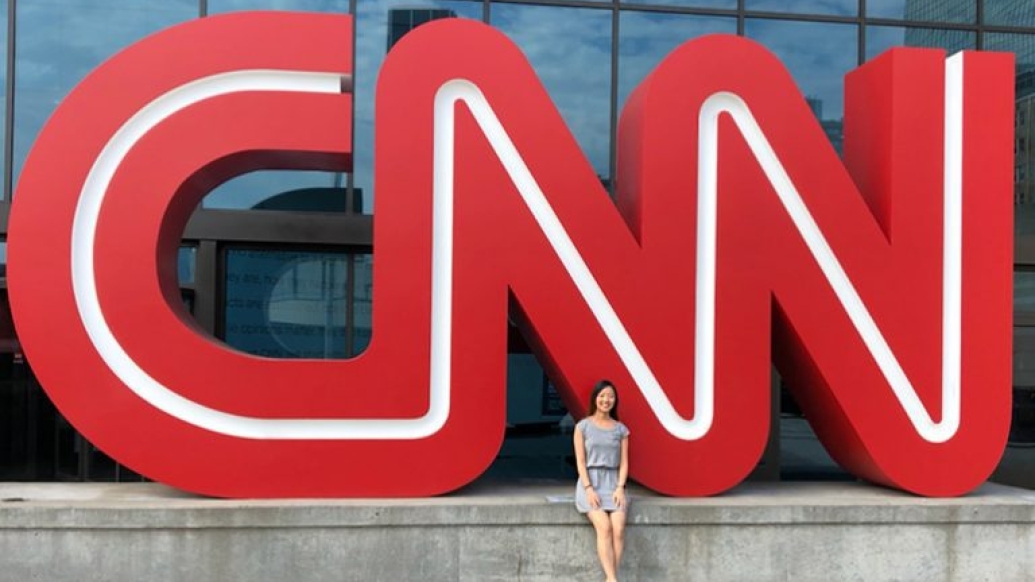For Gina Yu, her initial exposure to the pandemic wasn’t from the bedside, but from within the media news storm.
10:09 AM
Author |

Gina Yu expected her first day interning at CNN would be fairly relaxed — meeting colleagues, being shown around the office, setting up email passwords — akin to starting a new job in any big organization.
It didn't turn out that way.
"I got a quick welcome and was casually asked if I happened to know anything about coronaviruses," says the University of Michigan medical student. "Then, my manager announced that Washington [state] had the first confirmed case of novel coronavirus. My first assignment was to try to figure out which hospital this patient was at to see if we could get an interview."
Jan. 21, 2020, the day the first U.S. case of what would come to be known as COVID-19, coincided with Yu's arrival at the CNN headquarters in Atlanta.
Her three-month internship was the cornerstone of a year-long Global Health Media Fellowship run through Stanford University. One fellow each year is selected for the program, which teaches physicians-in-training to leverage the media in order to advocate and inform on global health issues.
Participants spend the fall semester taking master's level journalism classes at Stanford before moving to Atlanta to work with CNN chief medical correspondent Sanjay Gupta and others on the CNN Health team.
Yu, a fourth-year medical student from Saline, was the first-ever University of Michigan Medical School participant in the program, and 2020 was a particularly fateful year to be involved; the coronavirus pandemic was a confluence of every aspect of the fellowship, a global public health crisis that became the year-long focus of a media maelstrom.
MORE FROM THE LAB: Subscribe to our weekly newsletter
"I wish I would have kept a diary of the whole thing to remember all the details because the CNN Health team let me work on some incredible projects. They let me be involved right from day one," Yu says.
Over the next several weeks, Yu authored or co-authored many COVID-focused articles for the CNN website, from explainer pieces on how antibody testing works to early explorations of potential links between vaping and COVID-19 severity.
She shadowed senior correspondents to the CDC headquarters (also in Atlanta), and became a regular part of the research team helping to produce a series of COVID-19 televised town hall events anchored by Gupta. Eventually Yu, a Harvard alum who wrote about medicine for the student-run publication, the Harvard Crimson, wound up as a weekend on-call CNN Health staffer, the designated health team resource for the wider CNN team.
SEE ALSO: Seeking Medical Care During COVID-19
"Anything related to COVID-19 during the weekend that only a health person could answer basically fell to me and another colleague," she says. "It was almost as if we were residents, with our managers being [the] attending back-up. I was honored to be given the responsibility."
As a medical student, Yu provided a unique perspective to the CNN team. After learning from friends that students in programs were graduating early to join the fight on the pandemic front lines, she pitched a co-authored news article on the topic. She interviewed experts for research and stories and was able to reassure her sources that they wouldn't be misconstrued or misquoted.
In mid-March, as COVID-19 cases began to surge nationally, CNN shifted to home-based work for all non-essential team members, and Yu continued working remotely for the network until May. In a more typical year, the Stanford fellowship concludes with a capstone project abroad, but the pandemic and related travel restrictions made that impossible. The CNN internship, dominated by COVID-19, became the centerpiece of Yu's program experience.
Looking back, she wouldn't change that.
"I am interested in ophthalmology, particularly the global health aspects of ophthalmology," Yu says. "I knew coming in there were going to be a lot of parallels between the fellowship and what I hope to do, because the whole idea is to learn how to synthesize complicated topics and figure out what the public really needs to know. It turned out to be a real crash course."
The onset of the pandemic was a kind of crucible for that very skill, a real-world exercise with life-and-death consequences. Yu and her colleagues worked tirelessly not just to chase the story, but inform the public and convey facts that sometimes changed with each news cycle.
"The picture was changing every day and everyone worked so hard to figure out, 'Ok, what's the new recommendation? What's most important?'" Yu says. "I came away with so much more appreciation for the media."
Like Podcasts? Add the Michigan Medicine News Break on iTunes, Google Podcast or anywhere you listen to podcasts.
Yu's experience reinforced her belief that physicians should be able to distill and convey dense information in meaningful ways, especially for the mainstream media
"It was a truly amazing experience and I'm still trying to figure out how I can meld this all together," she says. "At the very least, being a good doctor means being able to communicate effectively with your patients. At the other end of that spectrum is taking a dynamic, complicated story and interpreting it for a huge general audience like they do at CNN.
"I can tell you that now I can't watch a newscast without thinking about the many people and how much work takes place behind the scenes," Yu explains. "The group I worked with at CNN was an incredible A-plus team and I feel so lucky to have been a part of it."

Explore a variety of healthcare news & stories by visiting the Health Lab home page for more articles.

Department of Communication at Michigan Medicine
Want top health & research news weekly? Sign up for Health Lab’s newsletters today!





